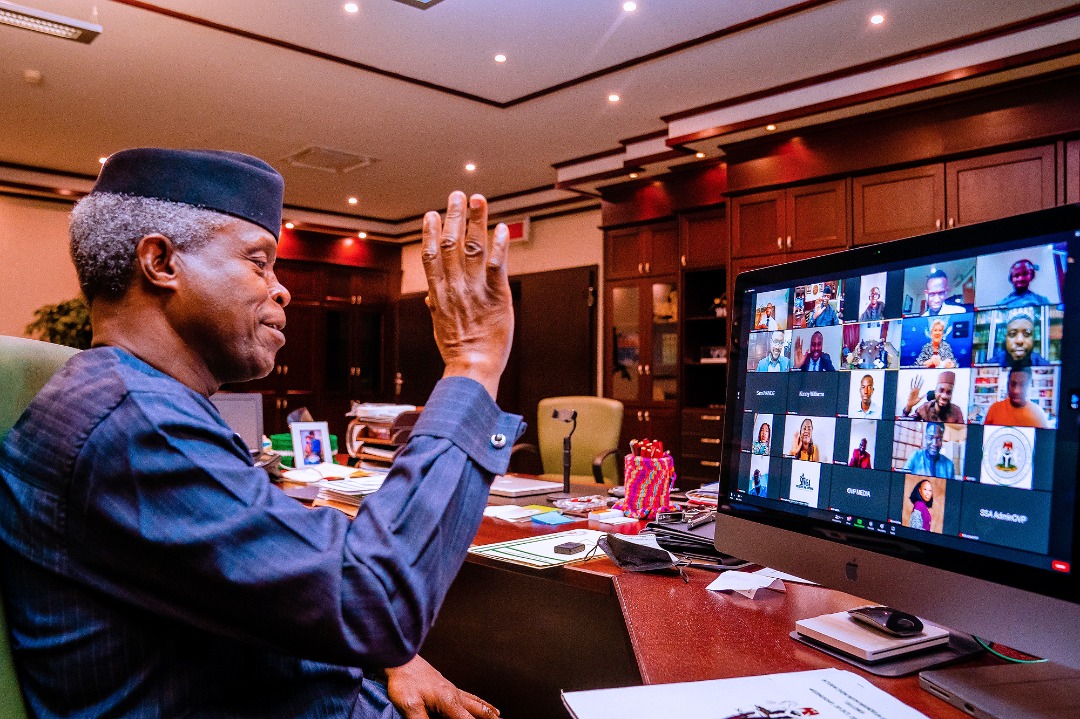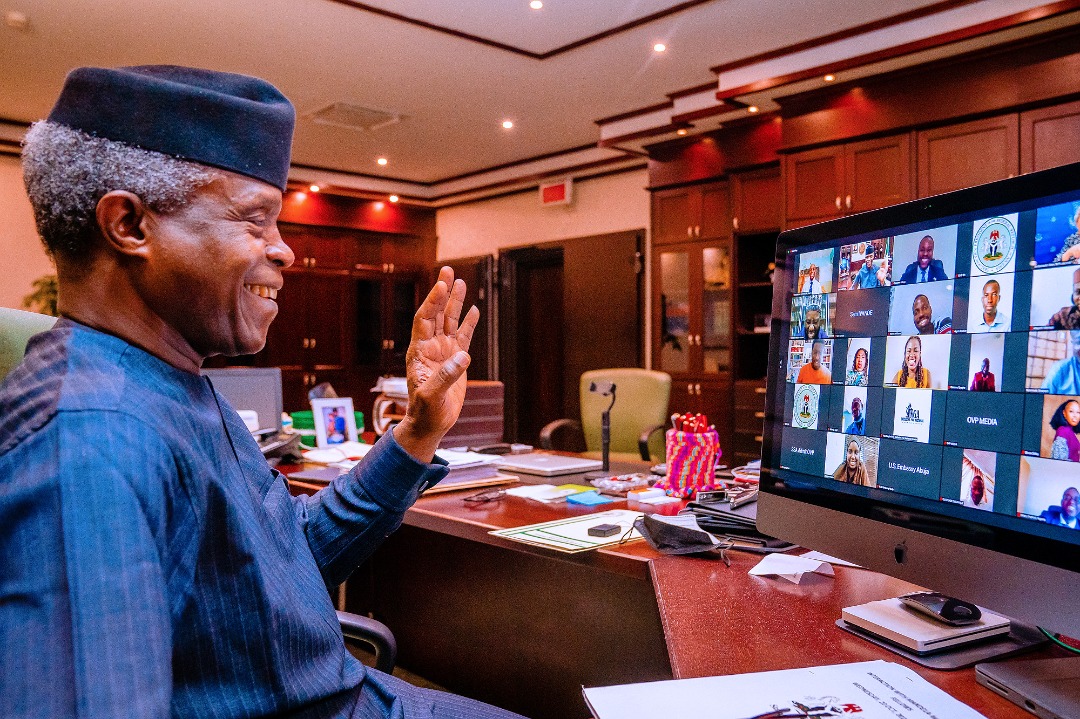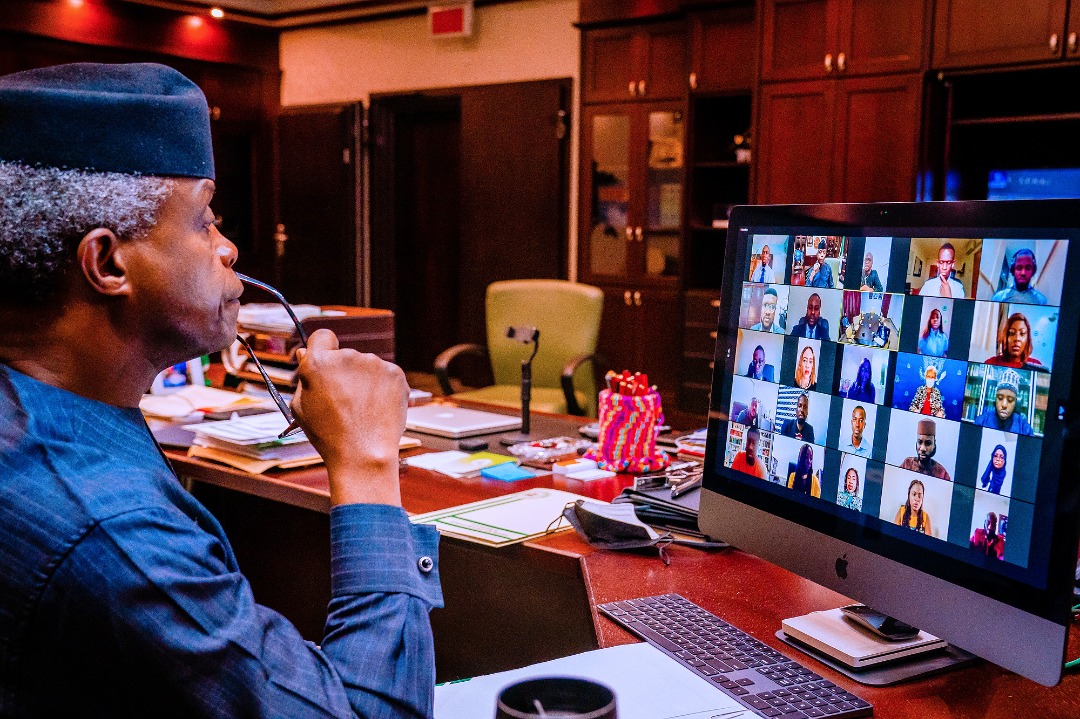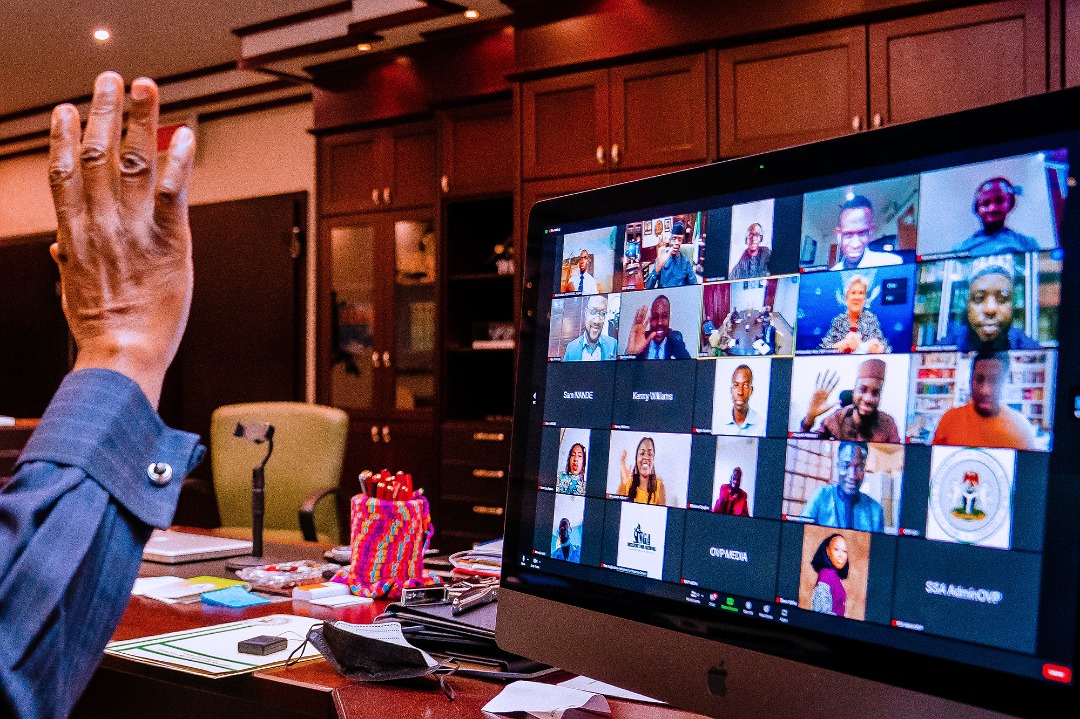Nigerian Fellows Of The Mandela Washington Fellowship For Young African Leaders
REMARKS BY HIS EXCELLENCY, PROF. YEMI OSINBAJO, SAN, GCON, VICE PRESIDENT OF THE FEDERAL REPUBLIC OF NIGERIA AT THE VIRTUAL INTERACTION WITH NIGERIAN FELLOWS OF THE MANDELA WASHINGTON FELLOWSHIP FOR YOUNG AFRICAN LEADERS ON THE 20TH OF OCTOBER, 2021
PROTOCOLS
Congratulations to you all on being selected as Mandela Washington Fellows, and also for the very great work that you are doing. We must commend the US Government for keeping the dream of the Young African Leaders Initiative, YALI alive. Listening to the leaders of the three tracks and the great work they lead, it is evident that we are listening today to Africa’s most exciting story, certainly Nigeria’s most exciting story. The story of a present and future that could be steered by our nation’s incredibly talented and optimistic young men and women.
The innovation, creativity, and thoughtfulness that I have seen in the different projects that you have developed, is evidence of your belief and confidence in the future of this country and the continent. I took time to look at all of the projects that are being done – a large number of them, different profiles and I read through all of them, and I am overwhelmed by just the sheer range and depth of what is being done.
This is my view is the best news possible; the news of great hope and enthusiasm about the future: hope is the fuel of progress and prosperity. I think that every generation has a responsibility to itself and the future to believe enough in its own abilities and God-given resources to build societies where people can live their lives, in peace, joy, and prosperity.
But within any generation, only a few wholeheartedly take on that challenge – the challenge of building a society. Most believe that the task is for someone else and that such endeavors cannot pay the bills, anyway.
So, let me say to you, you may not know this, but those of you so active in these various not-for-profit causes, belong to a small club of those ready to pay the price to see their countries and communities grow. You are individually and collectively nation builders, and that is what public service is all about; you are young public servants even if you are not in government employment.
I want to say something which may turn out to be controversial, but you need to go the extra length. If you are not already involved, get involved in politics. While a lot can be achieved in civil society, government still holds the ace in terms of capacity and resources to bring social goods to the largest numbers.
Besides, being deciders instead of pressure groups at the table in policy formulation are hugely different positions. The consummation of our great ideas to transform our societies ultimately will depend on “those politicians” as we sometimes derisively describe them.
I was once where you were, I was part of several civil society groups at the time. I joined the first civil society group when I was 24, I was teaching at the time at the University of Lagos. I also co-founded the anti-corruption group, Integrity, and then Convention on Business Integrity (which is still existing today and they function out of Abuja and Lagos).
At the time we published a weekly bulletin called “Scrutiny” to expose official corruption (and that was during the Abacha era). I was chair of the Legal Research and Development Centre, where we worked on civil rights issues and legal defense for the poor. We did a couple of legal defense initiatives, got funding from donors, and tried to do the best we could. But if I count the numbers of people that we were able to reach, maybe a hundred-odd or so. So, we achieved some good, but compared to the scale of the problem, it was really a little.
But in 1999 came politics, and I was appointed Attorney General of Lagos. With that platform, we took on corruption in the Lagos Judiciary and set a model. We reviewed the issues of corruption in the Lagos Judiciary and how to address it. From remuneration to discipline and we were able to put in place, an anti-corruption framework that has lasted several years.
I will just give you an example of what happened in Lagos State at the time. We did a survey of legal practitioners who practiced in the courts in Lagos, and we asked the question about the integrity of Lagos judicial officers at the time and 89% of them said that the Judiciary was notoriously corrupt (that was in 1999). We knew we had our work cut out for us.
We then decided, what were the real issues? Lagos judges at the time were paid N46,000 a month, and that was not enough to even pay school fees. So, we looked at remuneration, we took decisive steps on remuneration. The one fear that judges have is that will not have a home of their own when they leave office. The Lagos State government as a matter of policy decided to provide a home for judges and they can keep them when they leave office. Houses in Ikoyi, Lekki and Ikeja.
And then we took to the issue of discipline. If a report is made, we processed it quickly and forwarded to the NJC. As a consequence of the steps that we took, 22 magistrates and 3 judges lost their jobs, they were sacked for corruption, that was the first in the history of the state that anyone had ever been sacked for corruption or reprimanded.
When we did that survey again with the World Bank in 2007 asking the same questions about Lagos judges in the High Courts of Lagos, zero percent said judges were corrupt. It is not that the judges had a change of heart but we put in place a system, not just remuneration but also discipline. The reason why I make this point is that other States after what we did in Lagos, copied that very example. So, many States improved remuneration and a wide variety of things.
The point that I am making is that it took public office to be able to get the scale of change that is required to make a difference. Without public office I would have remained a pressure group activist, I would have done some nice things, (I was also a Rotaract fellow), but I wouldn’t have been able to make the changes that my country required.
The second thing we did in Lagos at the time was that we established the Citizens Rights Department. For the first time in the history of our country, a department was established in the Ministry of Justice for the rights of citizens. That was important because the Ministry of Justice is not just a ministry of law and order, it is a Ministry of Justice for the people. And that department had what was called the Office of the Public Defender, and that was a concept we borrowed from some US States and we were able to do legal defense, the government provided the funding, for thousands of Lagosians.
But the more interesting part of that story is that almost every state in Nigeria adopted the Citizens’ Rights Department, adopted the Office of the Public Defender. Now, go back to when I was an activist working in the Legal Research and Development Centre, where we tried to do some work on legal defense, we did a few but certainly couldn’t achieve the scale that we achieved when we were in public service.
Simply, the point I am making is that African nations and especially certainly our country, cannot afford to have their best minds and most committed social activists remain only in the civil space. No, we simply can’t afford it, you have to get involved in politics. You have to be in the position to make the difference on the scale that is required.
Of course, there are many who will not be involved in politics but those that are inclined should, and there will be many challenges even in the winning or getting heard in politics, but I want to say to you that it should be an objective that you should set for yourselves to get involved at whatever level of politics so that you can make the kind of difference on the scale that is required of you.
Thank you.





